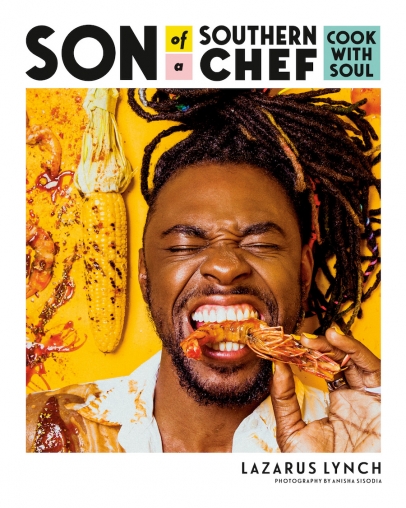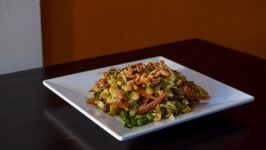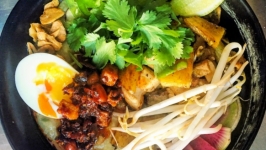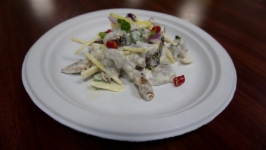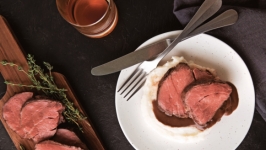Son of a Southern Chef
The story of online food personality and chef Lazarus Lynch is a quintessential Queens story. Look closely at Anisha Sisodia’s photos in Lynch’s debut cookbook, Son of a Southern Chef, and you may recognize the house exteriors where Lynch and friends stoop sit. Maybe you’re familiar with the yellow cab where Lynch munches nachos, or the subway car where he enjoys handfuls of cookie dough. It’s all New York City, Queens—home.
Lynch’s parents’ restaurant, Baby Sister’s Soul Food, opened in 2005 when he was 10 years old. This was where his family put their mark on Southside Jamaica’s food scene. “My story,” he said by phone, “is that my mother and father ran a restaurant and it was just the two of them. Back in the day, it was Styrofoam containers, plastic straws. Everything came out of the cooler. I would say things were a lot more down to earth and more homegrown. I think that’s the personality of Queens.”
Baby Sister’s stamp is reflected in Son of a Southern Chef with dishes like Mom’s Saltfish (dried and preserved salted cod) pocketed inside Guyanese Bake (“‘Bake’ are to the Guyanese what bagels are to the Jews. Everything belongs inside the bake,” reads Lynch’s headnote) sharing space with familiar soul food staples like brown butter candied yam mash and boiled peanuts. There’s also Lynch’s take on a New York City staple: Egg-and-Cheese Scramble on a Biscuit, comparable to the classic egg and cheese (and bacon) on a roll from your nearby spot. In the photos, Lynch bites into the breakfast sandwich while standing in a bodega aisle stacked with everything from Mr. Clean to Fancy Feast to sriracha.
By definition, soul food is a cuisine created by African Americans in the South. While Lynch makes it clear he’s not from the South, soul food is inextricably linked to his upbringing and his community. Whereas Lynch’s culinary training was in New American and French dishes, his cookbook encompasses something much more personal. Son of a Southern Chef is a book about his beliefs and what has always appealed to his taste buds.
“When I think of what soul food is, I think about it being food that was conversational, that’s easy to eat. Things can fall off your plate and sit on the table and you can put your bones on the side of the plate.”
For Lynch, this “messiness” illustrates the accessibility of cooking and an honesty in communal eating. There’s nothing immaculate about the way food looks. The oil and ranch sauce from his hot catfish sandwich is splattered all over the lunch tray. On page 100, there’s a stack of Chunky Tomato Soup with Mad Parmesan-stained bowls.
These photos aren’t meant to be pristine but fun. Rules are made to be broken and, as Lynch says, so are barriers. “I wanted [this book] to feel accessible, not just to youth, but to all generations.”
Soul food tends to be rich, be it breaded or fried, creamy or salted. There’s a reason it’s considered comfort food. Dishes specific to this cuisine are often dismissed at a time when health consciousness is sometimes reduced to knowing the difference between “good fats” versus “bad fats.” Doing so erases the origins of soul food as well as the ways vegetables and farming have played a key role in its development.
Lynch says, “I will say that soul food has gotten a bad rep. When you think about it, the quality ingredients—the grains, the legumes, the fruits, the tomatoes—a lot of that stuff is grown in the ground in South Carolina, North Carolina, Memphis, Alabama. You name it. These crops are delicious.”
Veggies are not forgotten in Son of a Southern Chef; one section proclaims “Veggies Ain’t Whack.” “They ain’t,” says Lynch. The celebration of vegetables also comes through in sections like “Savage Schnacks,” which includes recipes for fried okra and pickled things (be they pickles, carrots, peaches or green beans).
Farming and food share have been critical components of what sustained black communities post-slavery, post-Depression and beyond. Lynch grew up in Rochdale Village, an area he says has a community garden where neighbors can rent out lots for farming. Growing up, Lynch saw “tomatoes and peppers and Scotch bonnets and callaloo being grown in that lot.” The community garden provides fresh produce to the senior center nearby and offers classes for young people to learn more about vegetables.
“In the middle of July, we’d get a big thing of tomatoes brought to the house and they’re the most delicious and sweet tomatoes you’ve ever tasted. And they’re grown right in this community.”
Community, family and food make Son of a Southern Chef a testament and an archive to what Queens, Southern and black cultures have contributed to the food scene.


